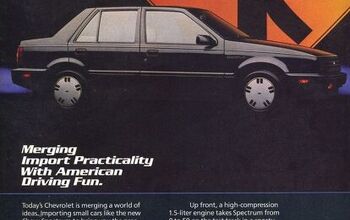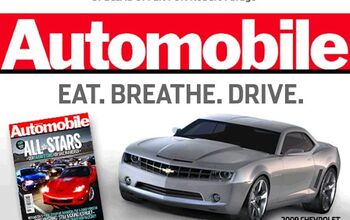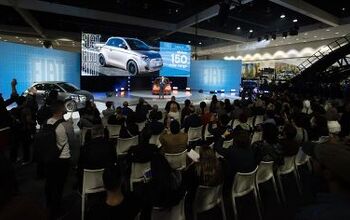Ask The Best And Brightest: Is SUA An American Pandemic?

Let’s make something very clear: This is not a post about Toyota. We are not advocating or accusing any brand. This is a post about a phenomenon called sudden unintended acceleration. An American phenomenon, as it seems at first glance. To get to the bottom of it, we need your help.
MarkKyle64 asked an interesting question during the discussion of TTAC’s NHTSA Data Dive: 95 Cars Ranked In Rate Of Unintended Acceleration Complaints:
”Can TTAC find out, for example, if German drivers report lower levels of UA than American drivers?”
I tried to. In an admittedly unscientific way. I had no other choice.
Hence, the unscientific way. I typed Toyota AND “Ungewollte Beschleunigung” into Google.
“Ungewollte Beschleunigung” is the accepted German translation for “unintended acceleration.” Type it in, and you will find a lot of reports about UA in the USA. So far, I haven’t found a single mention of an ungewollte Beschleunigung happening in Germany. Nothing. Neither for Toyota. Nor for any other car. Admittedly, I gave up after sifting through many pages of Google. But here is another indicator:
The German press, usually more than happy to increase their circulation, likewise came up empty. They intimate it’s an American affliction.
The German magazine Focus says: “Ungewollte Beschleunigung still remains a mystery.” Auto-Presse says: “Especially in the U.S.A., where most of the cars have an automatic transmission, the so-called ‘Sudden Unintended Acceleration’ can look back at a long tradition.”
But no mention of a German case. “Ungewollte Beschleunigung” doesn’t even warrant an entry in the German version of Wikipedia. If you want to find out what moves the Germans, who are obsessed with writing everything down, consult the German Wikipedia. You will find entries from “Augenbrauenpiercing” (eye brow piercing) to “zappenduster” (pitch-dark), but there is nichts about “ungewollte Beschleunigung”, not even in other articles.
As I am still in Tokyo, I asked Tomoko Schmitt, TTAC’s advisor for cross-cultural affairs, to do the same experiment in Japanese. The Japanese are a bit like the Germans of Asia: Exacting, nitpicking, and everything is documented. First we had to find the proper word for unintended acceleration. I instructed Frau Schmitto-San to consult Japanese reports about Toyota’s troubles in the U.S.A. to get the exact word.
The word is “itoteki denai kasoku” or “not intentional acceleration.” We did the same Google test. Forget about replicating it in the Japanese version of Wikipedia unless you know how to type Japanese. You would have to input “itoteki” in kanji, then “denai” in hiragana, and “kasoku” in kanji. Never mind, we did the hard work for you. Nothing there.
In the press, the Japanese reports about “itoteki denai kasoku” are mostly about the American phenomenon. But nothing escapes the Japanese urge for meticulous record keeping. Jiji Press, Japans leading wire service, quotes Japan’s Transport Minister Seiji Maehara. At a press conference on February 24, the Minister said that from 2007 to 2009 there were 134 reports of “itoteki denai kasoku” in Japan. 38 of those were about Toyota vehicles. “Toyota’s number is not particularly out of proportion,” said the minister. But he promised, his Ministry will look into all the cases, especially those of Toyota. Given the fact that Toyota’s Japanese market share hovered around 50 percent (including mini cars,) the number does not set off alarm bells. Actually, it makes Toyota look good.
Before the Minister’s press conference a week ago, “itoteki denai kasoku” wasn’t a topic in Japan. Even in the enthusiast forums of Mixi (Japan’s premier social networking site), the matter gets a “mondai nai” (no problem.)
One thing is clear so far: Germany doesn’t get UA incidents worthy of mention. Japan, a country with a population approximately half of the U.S.A., receives 134 reports in 3 years. The U.S.A. received nearly 6000 complaints for all brands for the 2008 model years alone, writes Consumer Report. It’s an UA pandemic!
Thetruthaboutcars.com has an international readership. Hence the question to the Best and Brightest abroad: What is the status of Unintended Acceleration in your country? UA in general. Not just Toyota. Best would be official data, such as in the case of Japan. Please with a link to the source. Absent of any official data, please use the German methodology.
Thank you. Dankeschön. Domo arigatou gozaimasu.

Bertel Schmitt comes back to journalism after taking a 35 year break in advertising and marketing. He ran and owned advertising agencies in Duesseldorf, Germany, and New York City. Volkswagen A.G. was Bertel's most important corporate account. Schmitt's advertising and marketing career touched many corners of the industry with a special focus on automotive products and services. Since 2004, he lives in Japan and China with his wife <a href="http://www.tomokoandbertel.com"> Tomoko </a>. Bertel Schmitt is a founding board member of the <a href="http://www.offshoresuperseries.com"> Offshore Super Series </a>, an American offshore powerboat racing organization. He is co-owner of the racing team Typhoon.
More by Bertel Schmitt
Latest Car Reviews
Read moreLatest Product Reviews
Read moreRecent Comments
- Carfan94 Never, it doesn’t get cold eneough here in TN, to switch to winter tires. But it gets cold enough that running Summer tires year round is impractical. I’m happy with my All seasons
- Analoggrotto Anyone who has spent more than 15 minutes around a mustang owner would know this will be in insta-hit.
- Akear If this is true then they won't go out of business. Good for them!
- FreedMike Interesting time capsule.
- 6-speed Pomodoro I had summer and winter tires for a car years ago. What a pain in the butt. You've permanently got a stack of tires hogging space in the garage and you've got to swap them yourself twice a year, because you can't fit a spare set of tires in a sportscar to pay someone else to swap 'em.I'd rather just put DWS06's on everything. But I haven't had a sportscar in 8 years, so maybe that's a terrible idea.
































Comments
Join the conversation
Second attempt at replying. I guess the system doesn't like Kanji.... Bertel, The "denai" seemed strange to me as "dehanai" is what I would use based on what I learned in school. So, instead, I searched google for ITOTEKI and KASOKU (caps for Kanji, space between the terms). Most of the hits I got related to the Toyota case are "ITO senu KASOKU" (lower case is Hiragana, of course no spacing in the Japanese) Also, searching the Japanese wikipedia for KASOKU did yield an article about Toyota's current recall. http://tinyurl.com/JPNwiki2010ToyotaRecall As for the case of "there's a recall if the manufacturer does one," how does Germany react in the case of corporate cover up? In past instances of Toyota misconduct (e.g. overwork of employees), the Japanese government hasn't done much more than mildly scold or slap on the wrist. In the Mitsubishi brake problem case, they were a rougher, and some Mitsubishi folks were shamed. But there still wasn't a frenzy like Toyota has been here. Of course, attention spans seem to shorten by the minute and people are becoming more and more desensitized, distracted, etc. so the media makes it more of a circus to get those eyeballs. Sub-standard reporting might also be tied to declining education standards, but that's a topic for a different web site. Btw, loved the "Frau Schmitto-San" bit
Can you imagine if we did favor manuals in the US? You would have people trying to drink their latte, munch on their bagel, apply make-up, and yes despite it being illegal to do so in most states: talk on their cell phone...all while steering and shifting, working the pedals...